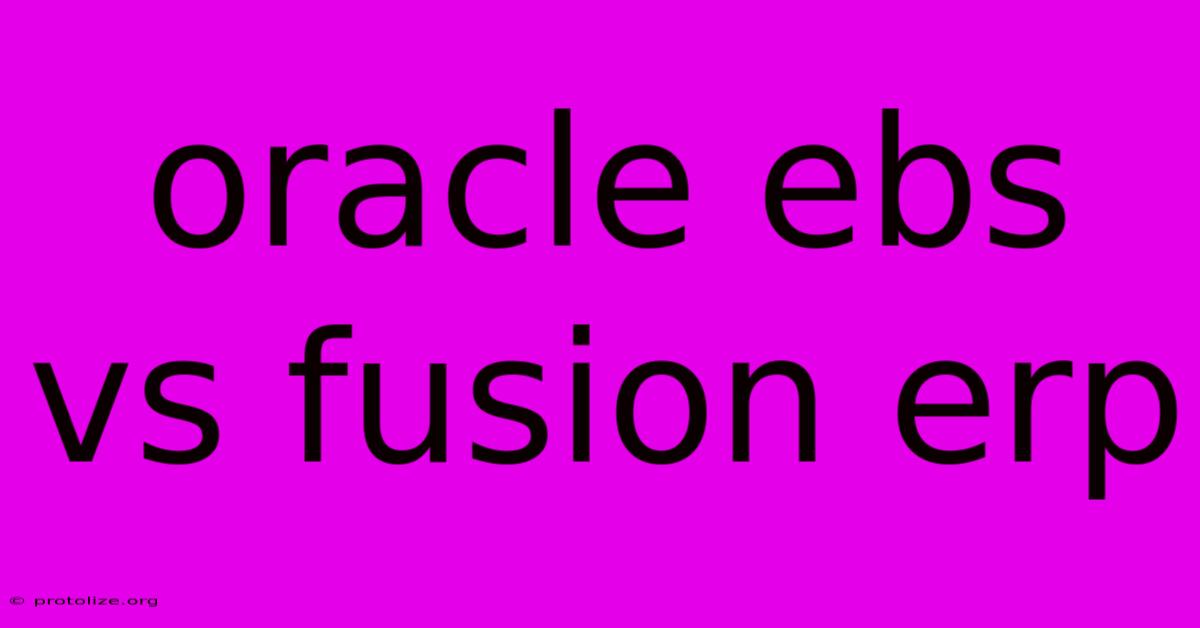Oracle Ebs Vs Fusion Erp

Discover more detailed and exciting information on our website. Click the link below to start your adventure: Visit Best Website mr.cleine.com. Don't miss out!
Table of Contents
Oracle EBS vs. Fusion ERP: Which One's Right for Your Business?
Choosing the right Enterprise Resource Planning (ERP) system is a critical decision for any organization. For businesses considering Oracle solutions, the choice often boils down to Oracle EBS (Oracle E-Business Suite) and Oracle Fusion Cloud ERP. Both are powerful systems, but they cater to different needs and priorities. This comprehensive guide will help you understand the key differences between Oracle EBS and Fusion ERP to make an informed decision.
Oracle EBS: The Proven Veteran
Oracle EBS has been a mainstay in the ERP market for years, establishing itself as a reliable and robust solution. It's a mature, on-premise system known for its extensive functionality and deep customization capabilities.
Advantages of Oracle EBS:
- Extensive Customization: EBS allows for significant customization, enabling businesses to tailor the system to their specific processes. This is a major advantage for organizations with highly unique or complex requirements.
- Mature and Stable: Years of use and development have resulted in a stable and well-tested system. Many businesses value this reliability and predictability.
- Large Ecosystem: A large community of experienced consultants and developers exists, making it easier to find support and expertise.
- On-Premise Control: Businesses maintain complete control over their data and infrastructure.
Disadvantages of Oracle EBS:
- High Implementation Costs: Implementing and maintaining EBS can be expensive, requiring significant upfront investment and ongoing resources.
- Complex and Difficult to Maintain: The extensive customization options can lead to complexity and difficulty in managing and upgrading the system.
- Limited Mobile Accessibility: EBS's mobile capabilities are generally less robust compared to cloud-based solutions.
- Legacy Technology: While continuously updated, it is based on older technology compared to Fusion.
Oracle Fusion Cloud ERP: The Modern Cloud Solution
Oracle Fusion Cloud ERP represents Oracle's modern approach to ERP. It's a cloud-based solution designed for agility, scalability, and ease of use.
Advantages of Oracle Fusion Cloud ERP:
- Lower Total Cost of Ownership: Cloud deployment reduces infrastructure costs and simplifies maintenance. Regular updates are included in the subscription.
- Improved User Experience: Fusion offers a more intuitive and user-friendly interface compared to EBS.
- Enhanced Mobility: Access to data and functionality is readily available through mobile devices.
- Scalability and Flexibility: The cloud platform allows for easy scaling to accommodate growth and changing business needs.
- Built-in Analytics and Reporting: Fusion offers advanced analytics capabilities built directly into the system.
- Regular Updates and Innovation: As a cloud solution, Fusion benefits from continuous updates and the integration of the latest technologies.
Disadvantages of Oracle Fusion Cloud ERP:
- Less Customization: Fusion's customization options are more limited than EBS. While it offers configuration flexibility, highly specialized custom development might be more challenging.
- Dependence on Internet Connectivity: Cloud-based solutions rely on a stable internet connection.
- Vendor Lock-in: Migrating away from Fusion can be complex.
- Change Management Challenges: Transitioning to a new system can require significant organizational change management efforts.
Choosing Between Oracle EBS and Fusion ERP: Key Considerations
The best choice depends heavily on your specific circumstances:
- Budget: Fusion generally offers a lower total cost of ownership over time, but the initial implementation costs of EBS might be lower for smaller projects.
- IT Infrastructure: EBS requires significant on-premise infrastructure, while Fusion leverages Oracle's cloud infrastructure.
- Business Needs: If you require extensive customization, EBS might be more suitable. If agility and scalability are priorities, Fusion is the better option.
- Technical Expertise: EBS requires specialized skills, whereas Fusion is designed for easier implementation and maintenance.
- Future-Proofing: Fusion offers a more future-proof solution due to continuous updates and integration with emerging technologies.
In summary: Oracle EBS is a powerful on-premise solution ideal for organizations with complex, highly customized requirements and a preference for on-premise control. Oracle Fusion Cloud ERP is a modern, cloud-based solution that prioritizes agility, scalability, and ease of use, making it a strong choice for organizations looking for a more cost-effective and easily maintainable system. Carefully assess your needs and resources before making a decision. Consulting with an experienced Oracle partner can provide valuable insights into which system aligns best with your long-term strategic goals.

Thank you for visiting our website wich cover about Oracle Ebs Vs Fusion Erp. We hope the information provided has been useful to you. Feel free to contact us if you have any questions or need further assistance. See you next time and dont miss to bookmark.
Featured Posts
-
Gukesh Dommaraju Youngest Grandmaster
Dec 13, 2024
-
Big Night Musicals 2025 Lineup
Dec 13, 2024
-
Yip Pin Xiu Engaged Paralympic Gold
Dec 13, 2024
-
Cops Twirling At Strip Club Video
Dec 13, 2024
-
What Is Erp System Examples
Dec 13, 2024
